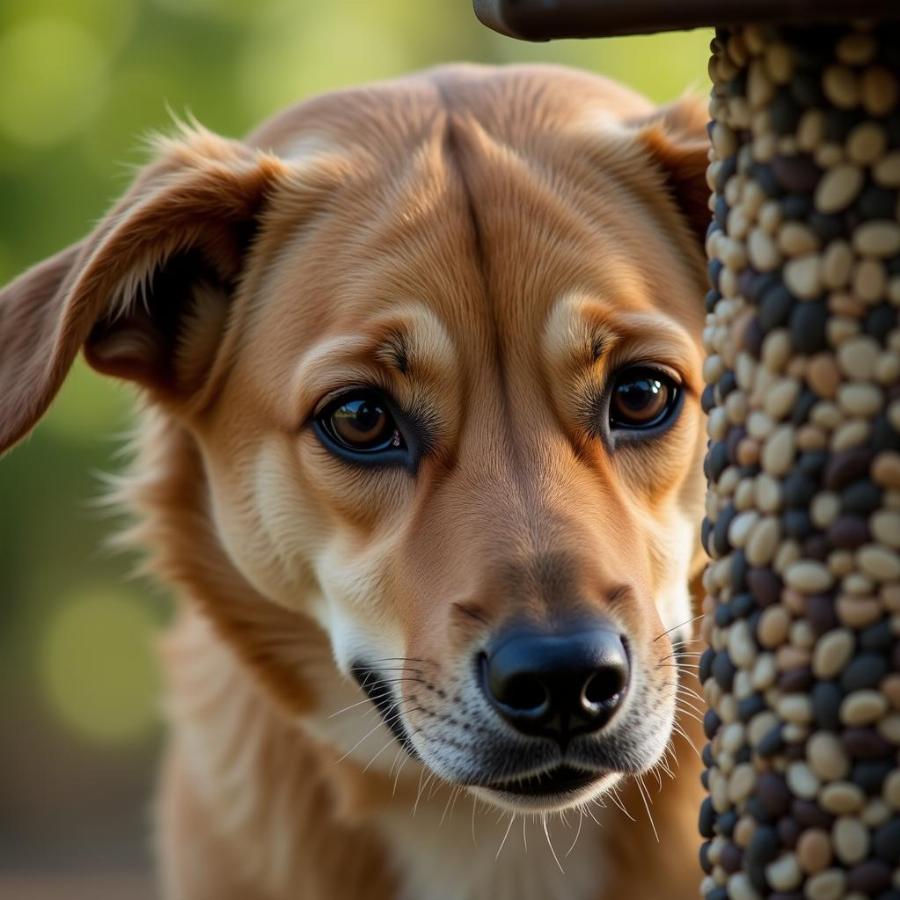Bird feeders are a common sight in many backyards, attracting a variety of feathered friends. But what happens when your canine companion decides the bird seed looks like a tasty snack? Can dogs eat bird seed? The short answer is: it’s generally not recommended. While a few stray seeds are unlikely to cause serious harm, bird seed can pose several potential risks to your dog’s health. This article will explore the reasons why bird seed isn’t ideal for dogs, the potential dangers it presents, and what to do if your dog ingests a large quantity.
Understanding the Risks of Bird Seed for Dogs
While bird seed itself isn’t inherently toxic, several factors contribute to its potential harmfulness to dogs. The ingredients in most commercial bird seed mixes can cause digestive upset and other health issues. Common ingredients like sunflower seeds, millet, and cracked corn are high in fat, which can lead to pancreatitis in dogs, a serious and potentially life-threatening inflammation of the pancreas.
 Chó ăn hạt chim
Chó ăn hạt chim
Furthermore, bird seed often contains small pieces of grit, shells, and other debris that can irritate a dog’s digestive tract. These hard bits can cause choking hazards, especially for smaller breeds. Mold and mycotoxins, which can grow on bird seed stored improperly, pose another serious threat. These toxins can cause neurological problems, liver damage, and even death in dogs.
What Happens if My Dog Eats Bird Seed?
If your dog sneaks a few seeds from a spilled feeder, it’s unlikely to cause significant harm. However, ingesting larger quantities can result in various symptoms. Common signs of bird seed ingestion include vomiting, diarrhea, loss of appetite, and lethargy. In more severe cases, dogs may experience abdominal pain, pancreatitis, or even an intestinal blockage, particularly if they’ve consumed large quantities of shells or hulls.
What to Do if Your Dog Eats Bird Seed
If your dog consumes a large amount of bird seed, contact your veterinarian immediately. They will be able to advise you on the best course of action, which may include inducing vomiting or providing supportive care. Describe the type of bird seed ingested, the estimated quantity, and any symptoms your dog is exhibiting. Early intervention is crucial to preventing serious complications.
Preventing Bird Seed Consumption in Dogs
The best way to protect your dog from the potential dangers of bird seed is to prevent access altogether. Place bird feeders out of your dog’s reach, either on high poles or in hanging baskets. Regularly clean up any spilled seed to minimize temptation. If you have a particularly persistent pup, consider using a dog-proof bird feeder or creating a designated feeding area inaccessible to your furry friend. Training your dog to leave the bird feeder alone can also be beneficial.
Is There Safe Bird Seed for Dogs?
No, there isn’t a type of bird seed specifically formulated for canine consumption. Even seemingly harmless seeds like sunflower seeds can be problematic in large quantities due to their high fat content. Instead of offering bird seed, opt for healthy dog treats or snacks designed to meet their nutritional needs.
Can My Dog Eat Sunflower Seeds From Bird Seed?
While a few sunflower seeds are unlikely to cause serious harm, it’s best to avoid them altogether. The high fat content in sunflower seeds can lead to digestive upset and pancreatitis in dogs. Additionally, the shells can be a choking hazard or cause intestinal blockages.
What About Other Seeds? Can Dogs Eat Millet or Nyjer Seeds?
Similar to sunflower seeds, millet and nyjer seeds found in birdseed mixes are not recommended for dogs. They can cause similar digestive problems and potential blockages.
Are There Any Benefits to Dogs Eating Bird Seed?
No, there are no nutritional benefits to dogs eating bird seed. In fact, the risks outweigh any potential benefits. A balanced dog food provides all the necessary nutrients for their health and well-being.
Conclusion
While the occasional stray bird seed might not cause significant harm, it’s best to keep bird seed away from your canine companion. The potential for digestive upset, pancreatitis, blockages, and mycotoxin poisoning makes bird seed an unsuitable snack for dogs. By taking preventative measures and providing your dog with healthy alternatives, you can ensure their safety and well-being. Remember to contact your veterinarian immediately if your dog ingests a large amount of bird seed.
FAQ:
- Is bird seed poisonous to dogs? While not inherently poisonous, certain ingredients and contaminants in bird seed can be harmful to dogs.
- What are the signs of bird seed poisoning in dogs? Vomiting, diarrhea, loss of appetite, lethargy, abdominal pain are common signs.
- What should I do if my dog ate a lot of bird seed? Contact your veterinarian immediately.
- How can I prevent my dog from eating bird seed? Place feeders out of reach, clean up spilled seed, and train your dog.
- Are there any safe alternatives to bird seed for dogs? Healthy dog treats and snacks are a much better option.
- Can my dog eat sunflower seeds from bird seed? No, they are high in fat and can cause digestive issues.
- What about other seeds like millet or nyjer seeds? These are also not recommended for dogs.
Do you have other questions about dog health? Check out these related articles:
- dog digestive blockage
- dog ate bird seed
- is bird seed harmful to dogs
- how to keep dogs away from your yard
- dogs eating bird seed
About Beaut Dogs
Beaut Dogs is your trusted source for comprehensive and reliable information on all aspects of dog ownership. From breed selection to nutrition and training, we provide expert guidance to help you care for your canine companion. When you need help, email us at [email protected] for detailed and accurate answers. Visit https://beautdogs.com to explore the wonderful world of dogs and learn how to care for them.